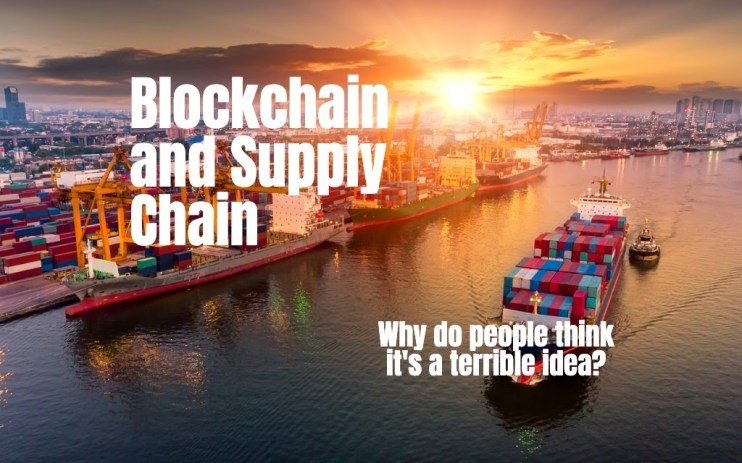Blockchain is Terrible for Supply Chain. Right?

Blockchain gets a lot of bad press in general. Either the technology is being overhyped. Or it is being confused with cryptocurrency and taking on all the negativity around that. There is plenty of coverage around how blockchain won’t scale and does not have sufficient performance to be viable in the enterprise.
And blockchain doesn’t solve the most pressing issues in supply chains.
The story goes that immutable data written onto a blockchain could be incorrect. The data could even be fraudulent. And that is correct. But blockchain was never intended to solve the problem of false or fraudulent data.
Another complaint is that blockchain systems are too complex to be implemented and are not performant enough to handle the volume of transactions associated with supply chains. Again, some of the proposed supply chain solutions are indeed quite complex. But it isn’t the blockchain part that is complex.
The part of the system which is blockchain is relatively simple. If you design the system correctly with Minimum Effective Blockchain (MEB), there is only a minimum of data stored in the ledger.
It was never a claim that blockchain had one hundred per cent transparency of all information across all parties. The transparency built into blockchain is only sufficient to ensure that every member of the network can confirm that data hasn’t changed since a point in time.
Blockchain was never intended to solve the problem of false or fraudulent data.
So, what problems will blockchain solve?
The premise and promise of blockchain are in providing a unified view of information across multiple parties where no single entity is in control. Every member of the network can know that the data they are reading is the same as the data everyone else is reading.
Furthermore, digital information – including digital information stored outside of the blockchain – can be verified and validated. To be explicit, the blockchain is used to verify and confirm that digital data has not been changed since a specific point in time. Through cryptography, a blockchain assures that the integrity of data.
The complexity comes from agreeing to standards and connecting existing systems to send and receive data from the blockchain. There is also often substantial effort required to bring operations to the point where they are sufficiently digital to benefit from a blockchain system. Across supply chains, there are still extensive areas where things are done on paper.
It was never claimed that blockchain would solve the issues of multi-party collaboration or digital transformation. Those challenges are going to exist regardless of whether or not blockchain forms part of the solution.
Blockchain also gets slated due to its reputation for transparency. There is a lot of commercially sensitive information when it comes to supply chains where the participants do not want the competitors – or even some of the others in the supply chain – to see the full detail of the information.
As systems are digitised, knowing that some aspects of the data will be stored or retrieved from a blockchain will accelerate the adoption of blockchain technology in the future.
With a multi-party supply chain transparency solution, blockchain technology can allow multiple stakeholders to work together and to share information in a way that is either not possible today or possible only in ways that rely on intermediaries and other third parties.
Today buyers and suppliers all around the world are experiencing first hand how elastic – or how fragile – their supply chains are. Trade finance is vitally important as the world’s economies begin to function again. Many companies are looking at how they can capitalise on the current situation to accelerate digital transformation programmes which have hereto now been idling in the “we’ll get to it” folder on someone’s desk.
The first order of business in addressing the challenges in supply chain is to move things from paper to digital and to ensure that there are sufficiently robust systems in place for auditing and inspecting to minimise fraud and maximise efficiency. As systems are digitised, knowing that some aspects of the data will be stored or retrieved from a blockchain will accelerate the adoption of blockchain technology in the future.
Blockchain gets much grief because it doesn’t solve some of supply chain’s biggest challenges. But blockchain was never promoted as solving those problems. Blockchain brings efficiency and trust and reduces both costs and errors in the reconciliation of data. Blockchain allows for the elimination of intermediaries – as their associated fees and latency – in the supply chain.

Get in touch with us info@blockchainrookies.com Twitter @igetblockchain
Troy Norcross, Co-Founder Blockchain Rookies